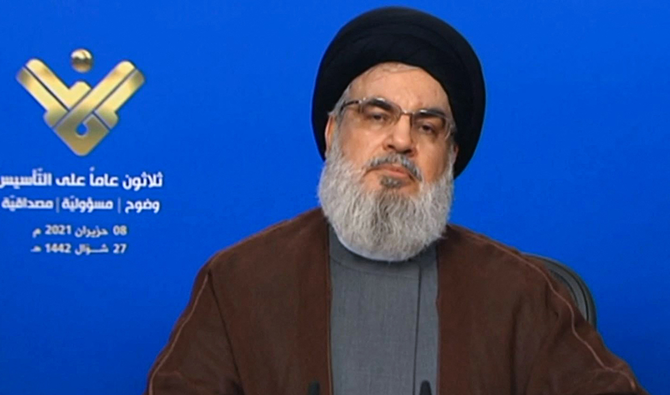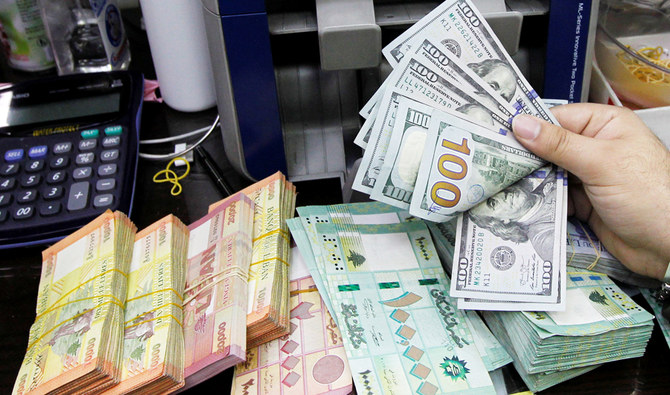
By Najia Houssari - arabnews.com -- BEIRUT: In a speech seen as an act of defiance against the Lebanese state and the US, Hezbollah leader Hassan Nasrallah on Wednesday insisted that Lebanon should be “negotiating with Iran to buy gasoline and diesel with the Lebanese currency if Lebanon’s shortages persist.” Seemingly unconcerned about the possibility that this might result in international sanctions being imposed on Lebanon, he said, during a televised speech: “Shipments of fuel will arrive at Beirut’s port, and let the state prevent their access to Lebanon.” Nasrallah’s speech came hours after reports that the Iraqi government has agreed to double a previous promise to supply Lebanon with oil, from 500,000 to 1 million tons. His comments provoked varying reactions among the Lebanese public.
Some were surprised and some rejected the idea of buying oil from Iran, given the risk of sanctions. Washington still has sanctions in place on Iran and has designated the military and political wings of Hezbollah as a terrorist organization. “Nasrallah used a high tone when he talked about bringing fuel from Iran,” MP Bilal Abdallah told Arab News. “The Lebanese are suffering from shortages in drugs, food and fuel. Their suffering should not be used to establish stronger bridges with Iran.” He said such matters “should be discussed within the state, as the Iraqis did. When things happen outside the framework of the state and parliament, I am not sure they can be beneficial for the country.” Abdallah added: “People’s suffering cannot be used for political purposes that affect Lebanon’s relations with its neighbors and the international community.”
Elias Hankhash, a politician who along with his Kataeb Party colleagues resigned from the parliament after the Beirut explosion last year in protest against government negligence, said that “Hezbollah controls all the state’s assets, including the illegal border crossings and the legal facilities and is a cover for the corrupt mafia.” He blamed Hezbollah “for the bankruptcy, hunger and the international isolation the Lebanese are facing” and said that “buying fuel from Iran exposes Lebanon to sanctions and more isolation.” He added: “It would be better for them to bring the fuel directly to Syria and stop the smuggling from Lebanon into Syria. We know exactly who is behind the smuggling of subsidized goods from Lebanon, which has humiliated the Lebanese waiting in never-ending queues at gas stations to fill their cars.” During his speech, Nasrallah had attempted to show sympathy for the Lebanese public by saying that “humiliating the people is unacceptable.”

By Najia Houssari -- arabnews.com --BEIRUT: The Lebanese pound hit a new low on the black market, reaching 14,000 for $1 after it had been somewhat stable in recent weeks at 12,000. This coincided with a new circular from the Banque du Liban (BDL) instructing commercial banks to gradually repay foreign currency deposits from July. The circular comes into effect as of June 30 for one year, subject to change or renewal. Under the circular, a depositor can withdraw $400 per month either in banknotes, by transferring it abroad or via bank card transactions that can be used in Lebanon and abroad. The circular also stipulates that a depositor can withdraw in parallel the equivalent of $400 in Lebanese pounds per month at the prevailing exchange rate on Sayrafa, BDL’s official platform. Commercial banks have yet to reveal whether their financial capabilities will allow them to implement the circular.
Meanwhile, the Capital Control bill to control the movement of dollars and prevent their transfer outside Lebanon, except in exceptional cases that do not harm the public interest, was approved by Parliament’s budget and finance committee. “The BDL circular and the approval of the Capital Control draft bill are long overdue,” Dr. Ahmed Al-Lakkis, director general of the Administrative and Financial Affairs Department in Parliament, told Arab News. “Lebanon may experience the same scenario as Greece, which had around 400 banks before the (financial) crisis but ended up with six afterward. Some banks in Lebanon can handle the new situation, but some may not be able to do so,” he added. “The fact that the exchange rate has risen by 1,000 Lebanese pounds against the dollar within two days may be caused by the anticipation of the money that will enter the market in light of BDL’s circular. However, I believe that those who’ll be able to withdraw dollars won’t spend them … but rather hide them at home because they trust neither the state nor the banks.”

By NAJIA HOUSSARI -- arabnews.com -- BEIRUT: Lebanese President Michel Aoun has approved an exceptional loan of up to LBP300 billion ($197 million) for the state electricity company to import fuel before supplies run out, according to an official statement. His approval came days before the country was due to experience a total power blackout. The hours for electricity rationing in various regions reached minimum levels on Monday morning, with supply to some areas no longer exceeding half an hour a day, and there were increased protests from people after generator owners hiked their service tariffs so that bills became more than LBP700,000 a month, whereas the minimum wage is LBP675,000 a month. The head of the General Confederation of Lebanese Workers in Lebanon, Bechara Al-Asmar, said that less than 5.51 percent of the population enjoyed the “blessing of electricity, fuel, communications and food in their palaces, not concerned with the daily deaths at the doors of hospitals, the oppression and the anger in people’s hearts every moment.” He warned of a “great explosion” that would spare nobody, no matter how high up they were or what position they occupied.
On May 28, the finance minister in the caretaker government, Ghazi Wazni, sent a request to the Banque du Liban (BDL) to open four credits worth $62 million to supply electricity production plants with fuel, but the BDL requested government approval. On Monday afternoon, Aoun agreed to issue the “exceptional approval” for the credits so that Electricite du Liban (EDL) could purchase fuel through the treasury advance. “The rationalization of subsidies will not currently include fuel or diesel used by generators,” a Finance Ministry source told Arab News. “It is currently limited to gasoline, along with medicines for incurable diseases and wheat, in order to ensure the continuation of pumping life into the arteries of the state.” The source also said that the BDL governor, Riad Salameh, had “reduced the reserves from $15 billion to $14 billion in order to be able to spend.”
/cloudfront-us-east-1.images.arcpublishing.com/mco/WRO3FATXTZFVBIMQE3OYSALB2Q.jpg)
By Agnes Helou -- defensenews.com -- BEIRUT — The Lebanese Navy expects to receive seven offshore patrol vessels, including four with help from France and three Protector-class OPVs that are part of U.S. military aid. “Currently, there is coordination with French shipbuilders to supply Lebanon with four OPV frigates, of 65- and 75-[meters] length each,” Navy Commander Senior Capt. Haissam Dannaoui, told Defense News recently. The French ships are not part of that country’s military assistance to Lebanon, he added, but they will be financed through a loan from France in accordance with the Rome 2 Conference, a 2018 ministerial meeting in Italy in support of Lebanon’s armed forces. France is expected to open a credit line of 400 million euros (about $488 million) to allow the Lebanese government to purchase French military equipment. “In regard to the specifications and cost of these vessels, we are still negotiating them, and we hope to reach an agreement soon,” Dannaoui responded June 3 to Defense News questions. In early May, the U.S. Defense Department notified Lebanon of planned delivery in 2022 of the three Protector-class patrol boats. The ships will help counter regional threats and keep maritime passages open, the U.S. State Department said May 21 in a statement after the first Defense Resourcing Conference to discusses deepening the two countries’ security collaboration.
Overall, the State Department announced $120 million in fiscal 2021 for Lebanon from the foreign military financing program, administered by the Defense Department. The amount increased $15 million from the year before. “These vessels will help protect the Lebanese coast and territorial waters. The Lebanese coast length is about 150 km, and patrol vessels will secure customs protection, prevent smuggling and illegal immigration, and the territorial waters against terrorist attacks,” said Lebanon Parliament member Wehbe Katicha, a retired Army general. He pointed out that the timing of receiving the vessels will facilitate securing the Lebanese oil exploration in the Mediterranean.
Khazen History


Historical Feature:
Churches and Monasteries of the Khazen family

St. Anthony of Padua Church in Ballouneh
Mar Abda Church in Bakaatit Kanaan
Saint Michael Church in Bkaatouta
Saint Therese Church in Qolayaat
Saint Simeon Stylites (مار سمعان العامودي) Church In Ajaltoun
Virgin Mary Church (سيدة المعونات) in Sheilé
Assumption of Mary Church in Ballouneh
1 - The sword of the Maronite Prince
2 - LES KHAZEN CONSULS DE FRANCE
3 - LES MARONITES & LES KHAZEN
4 - LES MAAN & LES KHAZEN
5 - ORIGINE DE LA FAMILLE
Population Movements to Keserwan - The Khazens and The Maans
ما جاء عن الثورة في المقاطعة الكسروانية
ثورة أهالي كسروان على المشايخ الخوازنة وأسبابها
Origins of the "Prince of Maronite" Title
Growing diversity: the Khazin sheiks and the clergy in the first decades of the 18th century
Historical Members:
Barbar Beik El Khazen [English]
Patriach Toubia Kaiss El Khazen(Biography & Life Part1 Part2) (Arabic)
Patriach Youssef Dargham El Khazen (Cont'd)
Cheikh Bishara Jafal El Khazen
Patriarch Youssef Raji El Khazen
The Martyrs Cheikh Philippe & Cheikh Farid El Khazen
Cheikh Nawfal El Khazen (Consul De France)
Cheikh Hossun El Khazen (Consul De France)
Cheikh Abou-Nawfal El Khazen (Consul De France)
Cheikh Francis Abee Nader & his son Yousef
Cheikh Abou-Kanso El Khazen (Consul De France)
Cheikh Abou Nader El Khazen
Cheikh Chafic El Khazen
Cheikh Keserwan El Khazen
Cheikh Serhal El Khazen [English]
Cheikh Rafiq El Khazen [English]
Cheikh Hanna El Khazen
Cheikha Arzi El Khazen
Marie El Khazen